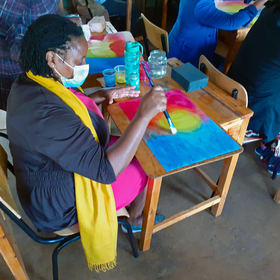In the lengthy period of school closure and social restrictions, colleagues in East Africa went to great lengths to work with new, unusual and often challenging conditions. In some cases, instead of offering lessons in classrooms, teachers planted lots of trees and flowers in the school gardens and grounds and walked many miles to visit small clusters of children in ‘family’ units, to offer them some sums, some stories and most importantly to see the children, talk to them, listen to them and to give them a boost and some hope!
Now, during a vibrant and absorbing two-week period, in the run-up to Christmas, 45 colleagues joined together to study, to sing and to share and discuss questions and issues of Waldorf principles and practices. Participants came from five countries in East Africa: Ethiopia, Tanzania, Uganda, Zimbabwe and Kenya. The early years / kindergarten cohort consisted of 23 colleagues, with 22 in the primary school cohort.
The resumption of the East African teacher development course is set against a broader regional context of sustainable development for Africa. The African Union’s Agenda 63 – The Africa We Want – aims to contribute to the development of “well educated citizens” and “healthy and well-nourished citizens”, responding to “the need for people-centred development, gender equality and youth empowerment.” (read more at www.au.int/en/agenda2063/overview)
On a global level, the development of school education in East Africa resonates with Agenda 2030 - the Sustainable Development Goals (SDGs) or Global Goals, established in the UN General Assembly in 2015 with a target date of 2030. Target 4.2. of the 2030 Agenda specifically calls for measures to ensure that, "all girls and boys have access to quality early childhood development, care and pre-primary education so that they are ready for primary education." (www.sdgs.un.org/goals)
The modules were led by a team of seven local tutors. Principal themes of learning and study included:
- the layers and levels of being in the human being
- the early years educator and early childhood care and learning – essential qualities and dispositions
- the practice of creating a ‘circle time’ in the nursery and kindergarten
- a study of human temperaments as an educational to foster knowledge, understanding and insight
- the power and richness of stories in classes 1 and 2
- handwork, form drawing and painting
Alongside these elements, students presented homework assignments – the introduction and teaching of traditional songs, including a wedding song from Zanzibar, and a song of welcome for a new baby, and the telling of fairy tales and folk tales from African and Europe.
And so, to work ... under pale blue skies, in warm sunshine, interspersed with dashing showers of rain, the sounds of human conversation and dialogue vied and mingled with the rasping call of the hadada ibis, the song of black-headed oriole and the insistent twittering of the sparrow-weavers. Just beyond the buzzing classrooms, the school’s gardening team worked with skill and quiet diligence to grow the food that filled the dining tables each day. Rows of carrots, spinach, onions and amaranths filled the beds, alongside bushes and trees full of papayas, mangoes, oranges, lemons, limes and guava.
One afternoon, half-way through the course, a couple of new arrivals were welcomed to the school’s small farm. Two young cows, in fine fettle, both ‘with calf,’ stumbled from the trailer. They had been purchased with a designated donation from an individual and by some beautiful coincidence, it happened to be the donor’s birthday. A great birthday gift! The hope is that, in time, the young cows will be ‘high-yield’, providing more milk to feed the school’s children.
The course culminated with a closing event that included an exhibition of the students’ work – handwork, painting and form drawing – and presentations by the two cohorts. And, as the days crept nearer to the Christmas season, we joined together to sing some carols – Away in a Manger and The twelve days of Christmas.
And if this weren’t enough, when the day-time chatter and laughter subsided, there were moments in the evening stillness and quiet when the low, deep rumble of a murmuring lion could be heard, as she or he padded along the edge of the nearby national park!
We took our leave, heading for buses, trains and planes, with tidings of good will ringing in our ears, and looking ahead to the next module, scheduled for April 2022.
Trevor Mepham (January 2022)

